11 feb 2016

A high-level Hamas delegation led by Mousa Abu Marzouk met on Wednesday with Lebanese premier Tammam Salam and discussed with him the latest developments of the Palestinian cause and the living conditions of the refugees in Lebanon.
The meeting was attended by a former Lebanese minister Hasan Manemneh, head of the Lebanese Palestinian dialog committee, and senior Hamas officials, including its representative in Lebanon Ali Baraka.
Head of the delegation Abu Marzouk briefed Salam on the latest developments in the Palestinian arena, especially regarding the talks between Hamas and Fatah in the Qatari capital Doha and the blockade imposed on Gaza. Abu Marzouk also talked about the recent UNRWA service and relief cuts, which affected the lives of the Palestinian refugees in Lebanon, in addition to the issue of the stricken Nahr al-Bared refugee camp.
The Hamas official urged the Lebanese government to intervene and pressure the donor countries and the UN to provide the funds necessary for supporting the UNRWA's budget in order to ensure continuity of its humanitarian services. For his part, premier Salam congratulated Hamas and Fatah on the renewed talks between them in Doha and called for necessarily restoring the Palestinian unity in order to face the challenges to the Palestinian cause.
The premier also expressed his rejection of the UNRWA cuts and pledged to make diplomatic efforts to support its budget.
The meeting was attended by a former Lebanese minister Hasan Manemneh, head of the Lebanese Palestinian dialog committee, and senior Hamas officials, including its representative in Lebanon Ali Baraka.
Head of the delegation Abu Marzouk briefed Salam on the latest developments in the Palestinian arena, especially regarding the talks between Hamas and Fatah in the Qatari capital Doha and the blockade imposed on Gaza. Abu Marzouk also talked about the recent UNRWA service and relief cuts, which affected the lives of the Palestinian refugees in Lebanon, in addition to the issue of the stricken Nahr al-Bared refugee camp.
The Hamas official urged the Lebanese government to intervene and pressure the donor countries and the UN to provide the funds necessary for supporting the UNRWA's budget in order to ensure continuity of its humanitarian services. For his part, premier Salam congratulated Hamas and Fatah on the renewed talks between them in Doha and called for necessarily restoring the Palestinian unity in order to face the challenges to the Palestinian cause.
The premier also expressed his rejection of the UNRWA cuts and pledged to make diplomatic efforts to support its budget.
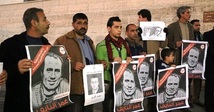
Palestinian activists on Wednesday rallied outside the Red Cross headquarters in Jenin to urge the Palestinian embassy in Bulgaria not to extradite Omar al-Nayef to the Israeli occupation.
The activists spoke out against Israeli attempts to arrest Palestinians taking refuge overseas. Bulgarian authorities gave the Palestinian embassy, where Nayef has taken refuge for over three weeks, 72 hours to turn Nayef in so that he could be brought before a Bulgarian court.
Omar Nayef escaped from Israeli custody 26 years ago. The Israeli occupation authorities requested that the Bulgarian government extradite him.
Nayef, a native of Jenin province, is married to a Bulgarian wife and is the father of three children.
The activists spoke out against Israeli attempts to arrest Palestinians taking refuge overseas. Bulgarian authorities gave the Palestinian embassy, where Nayef has taken refuge for over three weeks, 72 hours to turn Nayef in so that he could be brought before a Bulgarian court.
Omar Nayef escaped from Israeli custody 26 years ago. The Israeli occupation authorities requested that the Bulgarian government extradite him.
Nayef, a native of Jenin province, is married to a Bulgarian wife and is the father of three children.
10 feb 2016

Member of Hamas’s political bureau Dr. Mousa Abu Marzouk discussed Wednesday with members of the UNRWA crisis committee the recent protests over the agency’s aid cut.
The meeting that was held in Hamas office in Beirut was attended by Dr. Ahmed Abdul Hadi, Hamas’s deputy political official in Lebanon, Hamas representative in Lebanon Ali Baraka, politburo member of the Popular Front for the Liberation of Palestine Salah Youssef, and the member of the Palestinian People's Party Ghassan Ayoub.
The meeting dealt with two main points: the inter-Palestinian talks in Doha and the ongoing protests over UNRWA aid cut. Abu Marzouk briefed the committee members about the outcome of the dialogue between Fatah and Hamas movements in Doha.
The committee members, for their part, briefed Abu Marzouk on the recent developments of the popular and political protests over UNRWA’s decision to cut its services for Palestinian refugees in Lebanon.
Abu Marzouk had earlier participated in the sit-in that was organized outside UNRWA headquarters in Beirut as a message of support to the ongoing protests. Earlier Wednesday, Palestinian angry protesters closed UNRWA official headquarters in Lebanon in rejection of the agency’s reduction of services to Palestinian refugees in Lebanon.
UNRWA had earlier decided to reduce its aid allocated for Palestinian refugees in Lebanon. The Palestinian refugee in Lebanon has to pay 20 percent of hospitalization costs in government, NGO, and private hospitals.
The meeting that was held in Hamas office in Beirut was attended by Dr. Ahmed Abdul Hadi, Hamas’s deputy political official in Lebanon, Hamas representative in Lebanon Ali Baraka, politburo member of the Popular Front for the Liberation of Palestine Salah Youssef, and the member of the Palestinian People's Party Ghassan Ayoub.
The meeting dealt with two main points: the inter-Palestinian talks in Doha and the ongoing protests over UNRWA aid cut. Abu Marzouk briefed the committee members about the outcome of the dialogue between Fatah and Hamas movements in Doha.
The committee members, for their part, briefed Abu Marzouk on the recent developments of the popular and political protests over UNRWA’s decision to cut its services for Palestinian refugees in Lebanon.
Abu Marzouk had earlier participated in the sit-in that was organized outside UNRWA headquarters in Beirut as a message of support to the ongoing protests. Earlier Wednesday, Palestinian angry protesters closed UNRWA official headquarters in Lebanon in rejection of the agency’s reduction of services to Palestinian refugees in Lebanon.
UNRWA had earlier decided to reduce its aid allocated for Palestinian refugees in Lebanon. The Palestinian refugee in Lebanon has to pay 20 percent of hospitalization costs in government, NGO, and private hospitals.
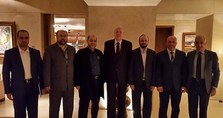
Lebanese President Najib Mikati met on Tuesday a delegation of Hamas Movement with whom he discussed the Palestinian cause, Palestinian reconciliation, and the situation of Palestinian refugees in Lebanon.
The meeting was attended by member of Hamas’s political bureau Mousa Abu Marzouk, the group’s representative in Lebanon Ali Baraka, and Dr. Khaldoun Sharif. Mikati stressed during the meeting that "the Palestinian cause remains the central issue and key to solving all crises in the region."
He added that "the Palestinian national reconciliation will be the cornerstone for unifying Palestinian ranks, and strengthening the Palestinian position in face of the Israeli Judaization schemes". The Lebanese people as well as Palestinians are committed to the Palestinian right of return.
"We firmly refuse any re-settlement attempt under any pretext", Mikati stressed. UNRWA's humanitarian duty towards Palestinian refugees, he underlined, must continue until a final solution to the Palestinian issue is reached.
He called on the international community and the five permanent members of the UN Security Council to continue their cash assistance to UNRWA. Mikati also urged the United Nations to support the reconstruction of Nahr al-Bared refugee camp to the north of Lebanon. Palestinian refugee camps' stability is an integral part of Lebanon's security, Mikati said, calling on the Palestinian leaders to prevent any attempt to destabilize the refugee camps.
Dr. Abu Marzouk, for his part, pointed out that Palestinian ongoing intifada, the national unity reconciliation, and Gaza siege were discussed during the meeting. The leader in Hamas Movement thanked Mikati for his keenness to follow-up on Palestinian issues.
The meeting was attended by member of Hamas’s political bureau Mousa Abu Marzouk, the group’s representative in Lebanon Ali Baraka, and Dr. Khaldoun Sharif. Mikati stressed during the meeting that "the Palestinian cause remains the central issue and key to solving all crises in the region."
He added that "the Palestinian national reconciliation will be the cornerstone for unifying Palestinian ranks, and strengthening the Palestinian position in face of the Israeli Judaization schemes". The Lebanese people as well as Palestinians are committed to the Palestinian right of return.
"We firmly refuse any re-settlement attempt under any pretext", Mikati stressed. UNRWA's humanitarian duty towards Palestinian refugees, he underlined, must continue until a final solution to the Palestinian issue is reached.
He called on the international community and the five permanent members of the UN Security Council to continue their cash assistance to UNRWA. Mikati also urged the United Nations to support the reconstruction of Nahr al-Bared refugee camp to the north of Lebanon. Palestinian refugee camps' stability is an integral part of Lebanon's security, Mikati said, calling on the Palestinian leaders to prevent any attempt to destabilize the refugee camps.
Dr. Abu Marzouk, for his part, pointed out that Palestinian ongoing intifada, the national unity reconciliation, and Gaza siege were discussed during the meeting. The leader in Hamas Movement thanked Mikati for his keenness to follow-up on Palestinian issues.
7 feb 2016
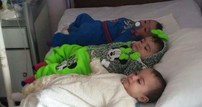
A Lebanese hospital in Sour (Tyre) city on Saturday detained three Palestinian refugee infants after their father failed to pay the cost of their treatment.
Local sources said the hospital demanded the father, Mohamed al-Nayef from al-Rashidiya refugee camp, to pay 400 US dollars in order to let him take his children.
The UNRWA used to cover the medical expenses of impoverished Palestinian refugees and their treatment in Lebanon's hospitals before it recently decided to reduce its health services.
Such measure raised the ire of Palestinian refugees and prompted them to take protest steps to pressure the UNRWA to reverse its decision.
Local sources said the hospital demanded the father, Mohamed al-Nayef from al-Rashidiya refugee camp, to pay 400 US dollars in order to let him take his children.
The UNRWA used to cover the medical expenses of impoverished Palestinian refugees and their treatment in Lebanon's hospitals before it recently decided to reduce its health services.
Such measure raised the ire of Palestinian refugees and prompted them to take protest steps to pressure the UNRWA to reverse its decision.
5 feb 2016
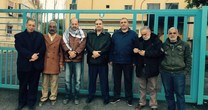
Palestinian refugees in Lebanon on early Friday rallied outside the UNRWA headquarters in Lebanon to protest the agency's decision to reduce the health services it provides for the Palestinians.
The Palestinian refugees reportedly shut down the UNRWA headquarters and closed the Rashidiya camp clinic in response to the agency’s decision to reduce its contributions in medical fees.
Local sources said the Palestinian refugees closed the UNRWA headquarters in Tyre, Sidon, Beirut, Bekaa, the North, and al-Rashidiya refugee camp so as to urge the UNRWA to backtrack on its decision to shrink its health services.
A Palestinian refugee said his son was treated in a hospital in Tyre and the administration asked him to pay $900 for hospitalization fees after the UNRWA refused to pay the bill.
The Palestinian refugees reportedly shut down the UNRWA headquarters and closed the Rashidiya camp clinic in response to the agency’s decision to reduce its contributions in medical fees.
Local sources said the Palestinian refugees closed the UNRWA headquarters in Tyre, Sidon, Beirut, Bekaa, the North, and al-Rashidiya refugee camp so as to urge the UNRWA to backtrack on its decision to shrink its health services.
A Palestinian refugee said his son was treated in a hospital in Tyre and the administration asked him to pay $900 for hospitalization fees after the UNRWA refused to pay the bill.
4 feb 2016

A number of Palestinian refugees on Thursday morning closed all offices and headquarters of the UNRWA in some Lebanese cities to protest the agency's persistence in its decision to reduce its medical services.
This protest step took place in response to the decision taken by Palestinian factions and popular committees to pressure the UNRWA into backtracking on its medical service cuts.
Palestinian refugees on Wednesday closed the main headquarters of the UNRWA in Lebanon and prevented all employees from doing their work. They also barred UNRWA vehicles from going in or out the building.
This protest step took place in response to the decision taken by Palestinian factions and popular committees to pressure the UNRWA into backtracking on its medical service cuts.
Palestinian refugees on Wednesday closed the main headquarters of the UNRWA in Lebanon and prevented all employees from doing their work. They also barred UNRWA vehicles from going in or out the building.
30 jan 2016

A human rights group have said that the families of Palestinian prisoners in Syrian jails are exposed to systematic extortion and fraud by mediators.
The action group for the Palestinian of Syria stated on Friday that some of those mediators are lawyers, who claim to know the whereabouts and fate of Palestinian prisoners detained by Syrian security apparatuses.
The group added that those mediators ask for exorbitant amounts of money in return for giving the families information about their relatives in jails, affirming that several families were blackmailed and defrauded by lawyers.
The money paid for such information amounts between 2000 and 20,000 dollars, according to the group.
There are about 1,048 Palestinian prisoners unaccounted for in Syrian jails and 431 others who died under torture.
The action group for the Palestinian of Syria stated on Friday that some of those mediators are lawyers, who claim to know the whereabouts and fate of Palestinian prisoners detained by Syrian security apparatuses.
The group added that those mediators ask for exorbitant amounts of money in return for giving the families information about their relatives in jails, affirming that several families were blackmailed and defrauded by lawyers.
The money paid for such information amounts between 2000 and 20,000 dollars, according to the group.
There are about 1,048 Palestinian prisoners unaccounted for in Syrian jails and 431 others who died under torture.
29 jan 2016

Hundreds of Palestinian refugees in Lebanon on Friday participated in a sit-in outside the UN-ESCWA headquarters in Beirut to protest the UNRWA's decision to reduce the health services it provides for the Palestinians.
The refugees, who came from all Palestinian camps in Lebanon, carried banners in Arabic and English calling on the UNRWA to backtrack on its decision to shrink its health services.
Representatives of Palestinian factions and popular committees as well as officials from social and charitable organizations participated in the sit-in, during which a letter of protest was handed to a UN official.
Hamas representative in Lebanon Ali Baraka stated during the protest that the UNRWA's service cuts would kill the Palestinian refugees, stressing the importance of providing UN services for the refugees until their return to their homes.
Baraka also urged the Lebanese government to support the demands of the Palestinian refugees in Lebanon.
The refugees, who came from all Palestinian camps in Lebanon, carried banners in Arabic and English calling on the UNRWA to backtrack on its decision to shrink its health services.
Representatives of Palestinian factions and popular committees as well as officials from social and charitable organizations participated in the sit-in, during which a letter of protest was handed to a UN official.
Hamas representative in Lebanon Ali Baraka stated during the protest that the UNRWA's service cuts would kill the Palestinian refugees, stressing the importance of providing UN services for the refugees until their return to their homes.
Baraka also urged the Lebanese government to support the demands of the Palestinian refugees in Lebanon.
22 jan 2016
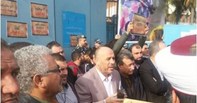
Representative of Hamas Movement in Lebanon Ali Baraka called Friday on UNRWA to reverse its decision to reduce its financial aid to Palestinian refugees based in Lebanon refugee camps.
Baraka’s remarks came during a sit-in organized outside UNRWA headquarters in Beirut. Dozens of Palestinian refugees participated in the event.
During the sit-in, Dr. Ahmed Abdul Hadi, deputy political official of the Movement in Lebanon, said that the popular protests will continue till meeting all Palestinian refugees’ demands.
For his part, member of Hamas political leadership in Lebanon Abu Khaled Jihad affirmed that a state of tension has prevailed among Palestinian refugees over the UNRWA aid reduction.
UNRWA had earlier decided to reduce its aid allocated for Palestinian refugees in Lebanon. The Palestinian refugee in Lebanon has to pay 20 percent of hospitalization costs in government, NGO, and private hospitals.
Baraka’s remarks came during a sit-in organized outside UNRWA headquarters in Beirut. Dozens of Palestinian refugees participated in the event.
During the sit-in, Dr. Ahmed Abdul Hadi, deputy political official of the Movement in Lebanon, said that the popular protests will continue till meeting all Palestinian refugees’ demands.
For his part, member of Hamas political leadership in Lebanon Abu Khaled Jihad affirmed that a state of tension has prevailed among Palestinian refugees over the UNRWA aid reduction.
UNRWA had earlier decided to reduce its aid allocated for Palestinian refugees in Lebanon. The Palestinian refugee in Lebanon has to pay 20 percent of hospitalization costs in government, NGO, and private hospitals.
21 jan 2016
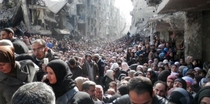
Palestinian refugees from Syria are amongst the most vulnerable refugees who seek safety in Europe. But, the legal framework that is being applied to their plight is a discriminatory one.
The majority of Palestinians in Syria were forced to resettle there, after fleeing or being forcibly expelled from their homes during the 1948 Nakba, or "catastrophe". In 2014, an issue of Al-Majdal, the Badil Resource Center for Palestinian Residency and Refugee Rights’ magazine, characterizes the current situation of Palestinian refugees leaving Syria as a component of the “ongoing Nakba”.
Of the 560,000 Palestinian refugees registered in Syria, according to UNWRA, “up to 280,000 are currently displaced inside Syria, with a further 80,000 displaced to neighboring countries including Lebanon, Jordan, Turkey, Egypt and, increasingly, to Europe.” The new generation of Palestinians are now again being displaced, this time forced to venture even further away from home.
Palestinian refugees who fled to Syria, due to the terrifying situation in their homeland, are now desperate for another option. For many, by far, their best bet is Europe. But, the few Western countries that have opened channels for Syrians to enter legally are almost always unavailable to Palestinians, because they do not hold Syrian passports. For many, the only hope for a safer and more stable future is to attempt the dangerous journey to enter Europe in secret -- along with thousands of refugees who have had to join the dangerous rubber boat journeys to Europe, in hope of a safe and better life.
Ziad al-Aloul, the head of the Palestinian Forum in Europe, announced in September of last year that almost 100,000 Palestinians from Syria have attempted to flee to Europe and, sadly, at least one thousand have drowned on their journey.
Aloul told the Al-Resalah online newspaper that some 500,000 Palestinians have fled from Palestinian refugee camps in Syria, and more than 200,000 of them are stateless and currently residing in Europe. The exact number of Palestinian refugees in Europe is unknown.
What happens to those who reach Europe?
According to the Institute for Palestine Studies, they often remain without legal status, at first. Those who have family members in Europe may have an easier time attaining residency, but even many of those with family networks must find a way through the bureaucratic hell which characterizes both asylum and family reunification procedures.
Greece and other European countries have created a special refugee status whereby Syrians may apply for and receive political asylum on the same day, but, for Palestinians, the process can be much more difficult because they do not have Syrian nationality. According to Professor Susan Akram, director of Boston University Law’s International Human Rights Clinic, there is considerable confusion and conflicting interpretations, within and among European states, about the status of Palestinian refugees living in Europe under the 1951 Convention Relating to the Status of Refugees. Most European countries either do not recognize or incorporate Article 1D of the 1951 Refugee Convention into domestic law, or interpret the article incorrectly, which cites:
“This Convention shall not apply to persons who are at present receiving from organs or agencies of the United Nations other than the United Nations High Commissioner for Refugees protection or assistance.”
So, while Palestine receives support and protection from organs such as the UN, displaced Palestinians may not receive this support:
“This excludes from the benefits of the 1951 Convention those Palestinians who are refugees as a result of the 1948 or 1967 Arab/Israeli conflicts, and who are receiving protection or assistance from the United Nations Relief and Works Agency for Palestine Refugees in the Near East (UNRWA)”. “While paragraph 1 of Article 1D is in effect an exclusion clause, this does not mean that certain groups of Palestinian refugees can never benefit from the protection of the 1951 Convention.”
The conclusion of the Convention is rather unclear:
“The position of Palestinian refugees under international refugee law is complex and continues to evolve. This Note clarifies some pertinent aspects of the position of such refugees and is intended to serve as guidance for use in refugee status determination.”
According to Badil, this means, practically, that Palestinian refugees in Europe are placed outside of the international protection system for refugees worldwide. Palestinian refugees often face difficulties when they apply for asylum, residence based on family reunification, employment, etc.
“Palestinian refugees are facing their most severe situation since 1948. They have had 50 years of occupation, nine years of a blockade in Gaza and, now, five years of conflict in Syria. When you look at all of that, how much more can they absorb?” asks UNRWA Commissioner General Pierre Krähenbühl.
Another issue, according to Ibrahim Abu-Lughod, lecturer at Birzeit university, are refugees who flee from Lebanon to Europe. They are only given an exit permit and no entry permit by Lebanese authorities. Thus, in case they are denied refugee status in Europe, they cannot return to Lebanon. This creates a legal “No-Man’s Land,” as these refugees no longer have a country to reside in.
So, while Western governments struggle to process refugees pouring over their borders, it is sad remembering that Palestinian refugees could have been resettled on their land a long time ago, if only the international community held the Israel state accountable for its expulsion of Palestinians, and forced the government to adhere to the UN resolution giving them the right to return to their homes.
Palestinian refugees fleeing Syria present a painful reminder of the international community’s failure to either assure the right of return or to provide compensation and viable alternatives for Palestinians refugees. The recent refugee crisis highlights the need to secure justice for the millions of stateless Palestinians around the world.
The majority of Palestinians in Syria were forced to resettle there, after fleeing or being forcibly expelled from their homes during the 1948 Nakba, or "catastrophe". In 2014, an issue of Al-Majdal, the Badil Resource Center for Palestinian Residency and Refugee Rights’ magazine, characterizes the current situation of Palestinian refugees leaving Syria as a component of the “ongoing Nakba”.
Of the 560,000 Palestinian refugees registered in Syria, according to UNWRA, “up to 280,000 are currently displaced inside Syria, with a further 80,000 displaced to neighboring countries including Lebanon, Jordan, Turkey, Egypt and, increasingly, to Europe.” The new generation of Palestinians are now again being displaced, this time forced to venture even further away from home.
Palestinian refugees who fled to Syria, due to the terrifying situation in their homeland, are now desperate for another option. For many, by far, their best bet is Europe. But, the few Western countries that have opened channels for Syrians to enter legally are almost always unavailable to Palestinians, because they do not hold Syrian passports. For many, the only hope for a safer and more stable future is to attempt the dangerous journey to enter Europe in secret -- along with thousands of refugees who have had to join the dangerous rubber boat journeys to Europe, in hope of a safe and better life.
Ziad al-Aloul, the head of the Palestinian Forum in Europe, announced in September of last year that almost 100,000 Palestinians from Syria have attempted to flee to Europe and, sadly, at least one thousand have drowned on their journey.
Aloul told the Al-Resalah online newspaper that some 500,000 Palestinians have fled from Palestinian refugee camps in Syria, and more than 200,000 of them are stateless and currently residing in Europe. The exact number of Palestinian refugees in Europe is unknown.
What happens to those who reach Europe?
According to the Institute for Palestine Studies, they often remain without legal status, at first. Those who have family members in Europe may have an easier time attaining residency, but even many of those with family networks must find a way through the bureaucratic hell which characterizes both asylum and family reunification procedures.
Greece and other European countries have created a special refugee status whereby Syrians may apply for and receive political asylum on the same day, but, for Palestinians, the process can be much more difficult because they do not have Syrian nationality. According to Professor Susan Akram, director of Boston University Law’s International Human Rights Clinic, there is considerable confusion and conflicting interpretations, within and among European states, about the status of Palestinian refugees living in Europe under the 1951 Convention Relating to the Status of Refugees. Most European countries either do not recognize or incorporate Article 1D of the 1951 Refugee Convention into domestic law, or interpret the article incorrectly, which cites:
“This Convention shall not apply to persons who are at present receiving from organs or agencies of the United Nations other than the United Nations High Commissioner for Refugees protection or assistance.”
So, while Palestine receives support and protection from organs such as the UN, displaced Palestinians may not receive this support:
“This excludes from the benefits of the 1951 Convention those Palestinians who are refugees as a result of the 1948 or 1967 Arab/Israeli conflicts, and who are receiving protection or assistance from the United Nations Relief and Works Agency for Palestine Refugees in the Near East (UNRWA)”. “While paragraph 1 of Article 1D is in effect an exclusion clause, this does not mean that certain groups of Palestinian refugees can never benefit from the protection of the 1951 Convention.”
The conclusion of the Convention is rather unclear:
“The position of Palestinian refugees under international refugee law is complex and continues to evolve. This Note clarifies some pertinent aspects of the position of such refugees and is intended to serve as guidance for use in refugee status determination.”
According to Badil, this means, practically, that Palestinian refugees in Europe are placed outside of the international protection system for refugees worldwide. Palestinian refugees often face difficulties when they apply for asylum, residence based on family reunification, employment, etc.
“Palestinian refugees are facing their most severe situation since 1948. They have had 50 years of occupation, nine years of a blockade in Gaza and, now, five years of conflict in Syria. When you look at all of that, how much more can they absorb?” asks UNRWA Commissioner General Pierre Krähenbühl.
Another issue, according to Ibrahim Abu-Lughod, lecturer at Birzeit university, are refugees who flee from Lebanon to Europe. They are only given an exit permit and no entry permit by Lebanese authorities. Thus, in case they are denied refugee status in Europe, they cannot return to Lebanon. This creates a legal “No-Man’s Land,” as these refugees no longer have a country to reside in.
So, while Western governments struggle to process refugees pouring over their borders, it is sad remembering that Palestinian refugees could have been resettled on their land a long time ago, if only the international community held the Israel state accountable for its expulsion of Palestinians, and forced the government to adhere to the UN resolution giving them the right to return to their homes.
Palestinian refugees fleeing Syria present a painful reminder of the international community’s failure to either assure the right of return or to provide compensation and viable alternatives for Palestinians refugees. The recent refugee crisis highlights the need to secure justice for the millions of stateless Palestinians around the world.

Head of the Department of Refugee Affairs at the Palestine Liberation Organization (PLO), Zakaria al-Agha, called on the UNRWA to backtrack on its ascetic decisions and medical policies for Palestinian refugees in Lebanon.
Al-Agha said in a press statement UNRWA’s resort to a policy of asceticism in its hospitalization services and the reduction of its coverage of treatment fees in private hospitals up to 20% is unacceptable in light of the tragic situation endured by Palestinian refugees in Lebanon.
He spoke out against UNRWA’s reduction of treatment aid for cancer-stricken patients and those diagnosed with cardiovascular disorders, among other chronic diseases, up to 37.5%.
He said UNRWA will only pay US$ 5,000 for such patients according to its 2016 medical agenda, instead of US$ 8,000 in 2015.
Al-Agha called on the UNRWA to seriously work on making up for the deficits rocking its budget allocated for Palestinian refugees by seeking new sources and donors and to implement a hospitalization policy that serves refugees’ needs in the best way possible.
A deal struck between the UNRWA, public hospitals, and the Red Crescent hospitals provided, in 2015, Palestinian refugees with 100% of treatment fees. In 2016 the UNRWA decided to reduce its funds, paying 95% of the same costs to the Red Crescent hospitals, 85% to public hospitals, and 80% to private clinics.
Al-Agha said in a press statement UNRWA’s resort to a policy of asceticism in its hospitalization services and the reduction of its coverage of treatment fees in private hospitals up to 20% is unacceptable in light of the tragic situation endured by Palestinian refugees in Lebanon.
He spoke out against UNRWA’s reduction of treatment aid for cancer-stricken patients and those diagnosed with cardiovascular disorders, among other chronic diseases, up to 37.5%.
He said UNRWA will only pay US$ 5,000 for such patients according to its 2016 medical agenda, instead of US$ 8,000 in 2015.
Al-Agha called on the UNRWA to seriously work on making up for the deficits rocking its budget allocated for Palestinian refugees by seeking new sources and donors and to implement a hospitalization policy that serves refugees’ needs in the best way possible.
A deal struck between the UNRWA, public hospitals, and the Red Crescent hospitals provided, in 2015, Palestinian refugees with 100% of treatment fees. In 2016 the UNRWA decided to reduce its funds, paying 95% of the same costs to the Red Crescent hospitals, 85% to public hospitals, and 80% to private clinics.
20 jan 2016
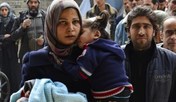
The Action group for Palestinians in Syria reported that 184 Palestinian refugees, including 21 children, in al-Yarmouk camp in Syria died due to the siege and shortage of health care.
In a report on Tuesday, the Action Group pointed out that the number of the victims of the siege included 123 males and 61 females.
The report revealed that the Yarmouk refugee camp lacks life necessities as well as medications and foodstuff including milk for the children, which badly affected its residents at the psychological and health levels.
The siege, which has been imposed by the Syrian regime and its allies for 919 days, made some refugees search for food in garbage containers and stand in long queues waiting for small amounts of food supplies, the report highlighted.
In a report on Tuesday, the Action Group pointed out that the number of the victims of the siege included 123 males and 61 females.
The report revealed that the Yarmouk refugee camp lacks life necessities as well as medications and foodstuff including milk for the children, which badly affected its residents at the psychological and health levels.
The siege, which has been imposed by the Syrian regime and its allies for 919 days, made some refugees search for food in garbage containers and stand in long queues waiting for small amounts of food supplies, the report highlighted.
17 jan 2016
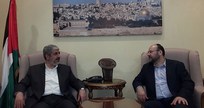
Head of Hamas's political bureau Khaled Mishaal has pledged to intervene urgently with the concerned parties to solve the problem of the medical services which the Palestinian refugees in Lebanon have encountered lately as a result of the UNRWA cuts.
Mishaal made his remarks during his recent meeting in Doha with Hamas representative in Lebanon Ali Baraka.
Mishaal affirmed that his Movement would always stand by the Palestinian people in Lebanon and support their just demands.
Baraka, for his part, briefed the Hamas political leader on the humanitarian conditions of the Palestinian refugee in Lebanon and the impacts of the UNRWA service cuts on their lives.
The two Hamas officials also tabled the issue of the ruined refugee camp of Nahr al-Bared and the need to reconstruct it as well as the humanitarian suffering of the Palestinians who fled the Syrian war.
Mishaal made his remarks during his recent meeting in Doha with Hamas representative in Lebanon Ali Baraka.
Mishaal affirmed that his Movement would always stand by the Palestinian people in Lebanon and support their just demands.
Baraka, for his part, briefed the Hamas political leader on the humanitarian conditions of the Palestinian refugee in Lebanon and the impacts of the UNRWA service cuts on their lives.
The two Hamas officials also tabled the issue of the ruined refugee camp of Nahr al-Bared and the need to reconstruct it as well as the humanitarian suffering of the Palestinians who fled the Syrian war.
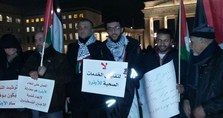
Palestinian and Arab organizations and groups on Saturday staged a sit-in outside the headquarters of the European Commission in the German capital Berlin to protest the UNRWA's recent decision to reduce the medical and educational services it provides for the Palestinian refugees.
Organizers of the sit-in stated that they held their protest against the UNRWA service cuts to express their solidarity with the Palestinian refugees in Lebanon.
They condemned the UNRWA for ignoring the difficult humanitarian situation which the Palestinian refugees in Lebanon suffer from, especially that the Lebanese government does not provide them with any social or economic rights.
Organizers of the sit-in stated that they held their protest against the UNRWA service cuts to express their solidarity with the Palestinian refugees in Lebanon.
They condemned the UNRWA for ignoring the difficult humanitarian situation which the Palestinian refugees in Lebanon suffer from, especially that the Lebanese government does not provide them with any social or economic rights.
